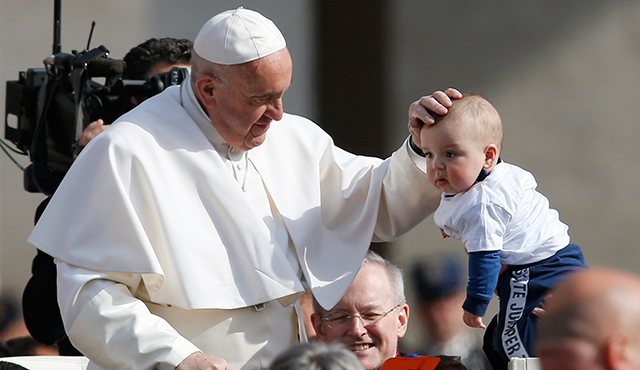VATICAN CITY (CNS) — The Pontifical Academy for Life and the Catholic Bishops’ Conference of England and Wales extended prayers for a terminally ill baby, the medical staff caring for him and the parents who have lost a legal battle to keep him on life-support and seek treatment in the United States.
Ten-month-old Charlie Gard was born in England with mitochondrial DNA depletion syndrome, which causes progressive muscle weakness, brain damage and respiratory or liver failure; it is typically fatal.
British hospital specialists believed the baby had no chance of survival, but the parents, Chris Gard and Connie Yates, crowdfunded nearly $1.7 million in four months to finance having the baby treated in the United States. Only 16 children in the world are believed to have been diagnosed with the rare syndrome.
When hospital officials wanted to stop providing life support for the baby, Gard and Yates went to a London court with their case, but the court ruled the baby should be allowed to “die with dignity” and doctors could stop providing life support.
After the ruling was upheld by an appeals court and the nation’s Supreme Court dismissed the parents’ case, Gard and Yates turned to judges in the European court of human rights. However, that court decided June 27 that it would not intervene in the case.
Archbishop Vincenzo Paglia, president of the Pontifical Academy for Life, said the situation of Charlie and his parents “has meant both pain and hope for all of us” and he assured them of his prayers.
“We feel close to him, to his mother, his father, and all those who have cared for him and struggled together with him until now,” he said in a written statement dated June 28, and posted online by Vatican Radio June 29.
The important question to ask in this and other unfortunately similar cases, he said, is, “What are the best interests of the patient?”
“We must do what advances the health of the patient, but we must also accept the limits of medicine,” he said, and, according to Catholic teaching, “avoid aggressive medical procedures that are disproportionate to any expected results or excessively burdensome to the patient or the family.”
However, the wishes of the parents also must be heard and respected, he said, “but they, too, must be helped to understand the unique difficulty of their situation and not be left to face their painful decisions alone.”
If the relationship between patient, guardians and doctors is “interfered with, everything becomes more difficult and legal action becomes a last resort,” the archbishop said.
There is also the “risk of ideological or political manipulation, which is always to be avoided, or of media sensationalism, which can be sadly superficial,” he added.
Reacting to the European court ruling, a spokesperson for the Catholic bishops’ conference said the definitive ruling that “baby Charlie Gard cannot undergo any further treatment is heartrending, most particularly for his parents and family.”
“In this difficult case, all sides have sought to act with integrity and for Charlie’s good as they see it. Understandably, Charlie’s parents wish to do everything to save and improve Charlie’s life. We hope and pray that in the wake of this decision, they are able as a family to find peace over the coming days and weeks. We also encourage the Catholic community to pray for Charlie, his parents and all those that have been caring for him.”
“Sadly, prolonged terminal illness is part of the human condition,” the written statement said. “We should never act with the deliberate intention to end a human life, including the removal of nutrition and hydration so that death might be achieved. We do, sometimes, however, have to recognize the limitations of what can be done, while always acting humanely in the service of the sick person until the time of natural death occurs.”

